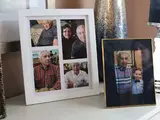The heroes of the pandemic: “When the world is burning, I must put out the fire”
On a Thursday night in July, Viviana Martínez-Bianchi stood under the drizzling rain outside the Holton community health clinic in Durham, North Carolina, as a long line of cars slowly inched its way toward her.
Wearing a blue doctor’s coat and a plastic face shield misted with rain drops, the family physician was among a handful of Duke University doctors working this covid-19 testing site, swabbing patients through their car windows. She approached a young boy who squirmed in his father’s lap. He looked up with wet eyes at her long, cotton swab and screamed.
“No te preocupes, ya casi termino,” she said as she stuck the swab in his nose—“Don’t worry, this will be over soon.”
“La doctora Viviana” is quickly becoming a household name among North Carolina’s Latino families. For months, the Argentinian doctor, with long, salt-and-pepper hair and kind eyes, has appeared in social media videos and Spanish-language television news segments advising members of the community to wear masks, wash their hands and keep six feet of distance.
“Covid-19 is preventable and...everyone can reduce their risk of contracting and spreading this highly contagious virus,” she said in a May video sponsored by the North Carolina Department of Health and Human Services (NCDHHS), published in Spanish and English.
Though Martínez-Bianchi has been serving the community for 14 years, her work feels more important now than ever. Across the country, covid-19 is having a disproportionate impact on Latinos due to a confluence of factors, including health and economic disparities unique to Latin American immigrants. A large share of the Latino immigrant population work in jobs deemed essential, like construction and housekeeping. According to a recent report, 38 percent of low-wage Latino workers in the U.S. lack health insurance.
In North Carolina, the grave impact of those disparities is evident in covid-19 data. When coronavirus numbers peaked in June, nearly half of cases in the state were Latinos (in cases where ethnicity was known), despite the group making up just 9.6 percent of the general population. As of early September, the rate of Latinos testing positive for the virus in North Carolina was 35 percent of cases, still more than any other group. The only pediatric death related to coronavirus in North Carolina was an eight-year-old girl whose Mexican immigrant father is an essential worker in construction.
“There wasn’t enough attention given to people living in situations of maximum vulnerability,” Martínez-Bianchi told Univision/Enlace Latino NC during a July interview. “Not in our city, not in our county, not in our state, not in the entire country.”
At the start of the pandemic, Martínez-Bianchi and a small cohort of Latina doctors and medical professionals in North Carolina came together to form a coalition to flatten the curve within the state’s Latino community. They call themselves the Latinx Advocacy Team & Interdisciplinary Network for covid-19, known as LATIN-19.
LATIN-19’s core group—including Gabriela Maradiaga-Panayotti, a pediatrician from Honduras; Leonor Corsino, an endocrinologist from the Dominican Republic; and Rosa Gonzalez-Guarda, a Cuban-American nurse and professor of nursing originally from Miami—has grown to include more doctors and nurses, as well as representatives from public schools and local government.
In weekly Zoom meetings, which are open to the public and often feature organizers from the Latino community, dozens of people speak about their concerns. Participants commit to collaborate across county lines, modeling each other’s best practices in clinics and acting as a network to help connect mutual aid groups to funding. LATIN-19 also writes letters to the governor with concerns and demands, ranging from more testing sites to better protections for meatpacking and poultry plant workers.
And they’re making inroads. While it’s still too early to analyze the data in detail, the sheer visibility of LATIN-19 may be helping to lower case numbers among Latinos in a southern state struggling to beat the coronavirus. At the very least, the group’s efforts are providing support and solidarity for a community that often feels overlooked.
“As family doctors, we have the opportunity to have a bigger voice,” Martínez-Bianchi said. “We are working with the health department through community activism. And that makes me really proud.”
The tipping point
In August 2019, hours after a white man opened fire at a Walmart in El Paso, Texas, killing 22 people, the nation learned that the shooter wrote a manifesto explaining that his targets were Mexicans. The massacre sent sharp pangs of fear through Latino communities nationwide.
Nearly 2,000 miles away in Durham, Maradiaga-Panayotti thought of her patients, immigrant families living and working in the South who often felt most comfortable expressing their stories and emotions to her in their native language, Spanish. She considered the dangerous—and sometimes tragic—impact of growing anti-immigrant attitudes, and she asked herself what she could do as a health professional to improve the lives of Latinos.
That day, she reached out to a few of her Latina colleagues. Their meeting a few weeks later laid the foundation for what would eventually become LATIN-19.
The doctors maintained an informal dialogue about their community’s needs and even met with a local Latino nonprofit in September 2019 to start conversations about what holistic community healthcare could look like. In early March, Martínez-Bianchi and Maradiaga-Panayotti officially formed LATIN-19. They held their first meeting on March 18.
“There was never a formalized collaboration of Spanish-speaking medical professionals on a community level,” Martínez-Bianchi said of the group. “We anticipated that the pandemic was going to disproportionately affect the Latino community.”
Without free testing and Spanish-language information early on in the pandemic, Latinos did not have a way to know if they were sick. In June, 77 percent of Durham County residents who tested positive for covid-19 were Latino, though they make up only 14 percent of the population.
Martínez-Bianchi described the summer as a “boiling point,” saying she and her colleagues knew it would “burst if we [didn’t] get it under control.”
LATIN-19 reached out to NCDHHS in June through a formal letter acknowledging that “the covid-19 pandemic reveals and amplifies deep inequities that put Latinx communities at risk on multiple fronts.”
The letter also expressed “a lag in accurate, timely communication of vital information in accessible languages and with culturally-relevant messaging, such as mitigating risk in multigenerational homes.”
A few days later, on June 10, the group was in a meeting with NCDHHS Secretary Mandy Cohen and stakeholders. On the call, Durham city councilwoman Javiera Caballero demanded an admission from the governor’s office: “an acknowledgement that we were caught flat-footed. We’ve missed critical time that’s going to cost people’s lives.”
Pablo Friedmann, a member of LATIN-19 who works at Durham Public Schools, stressed the importance of releasing demographic data.
"People are going to die if that doesn’t come out,” he said. “We can’t hide behind the privacy shield when there are dozens of outbreaks.”
That day, Cohen fully acknowledged the shortfalls—such as a failure to report the rates of infection in Latino communities and a lack of outreach to communities most in need. She committed to prioritizing the community.
In an interview with Univision/Enlace Latino NC, Cohen said it was the first time the state’s public health department “so deeply” collaborated with Latino organizations.
That came as some politicians across the state expressed outright hostility toward Latinos. In July, U.S. Senator Tom Tillis (R-N.C.) blamed Latinos for high rates of infection in the state. During a virtual town hall, he proclaimed, without any evidence, “we do have concerns that, in the Hispanic population, we've seen less consistent adherence to social distancing and wearing a mask.”

LATIN-19’s visibility has been crucial in bridging the gap.
Rodney Jenkins, director of Durham County Department of Public Health, said discussions with LATIN-19 were essential to establishing trust with the community. Many public officials know that Latino immigrants, especially those who are undocumented, hesitate going to a government-run health facility and providing information about where they live for fear of entering a database that would put them on ICE’s radar.
“The LATIN-19 group was instrumental in helping us connect and communicate with the Latinx population, to reduce the fear,” said Jenkins. The mention of “government,” he said, often causes “hesitation” among immigrants.
After the call, NCDHHS asked Martínez-Bianchi to serve as an adviser to help the department address the health disparities of the Latino community—and to build trust. Since then she has volunteered her time, working 90 hours a week in addition to her role as a physician, meeting with NCDHHS, appearing in educational videos and speaking at news conferences. The department recently hired her in a part-time role as Hispanic/LatinX Medical Advisor.
“It was kind of surprising to find a space so open to listening to us,” Martínez-Bianchi told Univision/Enlace Latino NC.
Mutual aid becomes “crucial” for Latinos
Outside a Compare Foods supermarket off Avondale Road in Durham, a cohort of immigrant women volunteers sell food at least once a month to raise money for community members in need.
Grassroots immigrant organizer Ivan Almonte began organizing the fundraisers in early June after receiving a call from the family of a woman who died due to coronavirus-related causes.
At the June event, pupusas sizzled on a flat-top grill and teenagers shucked corn as people set up propane tanks and drew colorful signs to raise money while celebrating the life of a woman many of them didn’t know. The woman’s grieving husband, Don Jerónimo, thanked the crowd via speakerphone for their support. The food sale raised $3,000 for the family.
The organizers, who call themselves “ La Semilla,” have long supported immigrant families, including those left behind by deportees. During the pandemic, La Semilla has raised thousands of dollars for Latino families.
In July, LATIN-19 began inviting La Semilla and other grassroots immigrant community groups to speak at weekly meetings, where they have the chance to explain to doctors and county health department representatives from around the state the realities facing the community.
Almonte told Univision/Enlace Latino NC that the lack of support from the state has been “an embarrassment.”
“But the support from our own community is crucial,” he said.
According to Almonte, many Latinos do not trust hospitals and doctors. He shared stories with LATIN-19 of patients dying and families not being notified for days.
In interviews with community members, various Latinos told Univision/Enlace Latino NC that they fear going to the hospital if they exhibit coronavirus symptoms. Others have said they received bad care, often without a Spanish interpreter.
Martínez-Bianchi also described a moment with a family who told her they were terrified of being in a hospital and separated from their children much in the same way they were fearful of being separated at the border or being taken from their homes by ICE.
The doctor said she encourages families to develop a coronavirus emergency plan the same way they would prepare for a worst-case immigration scenario.
“In this case, it should be ‘If I end up in the hospital with covid, who will take care of my kids?’” she said. “If there aren’t relatives, think of a neighbor, a friend to be in charge. Keep the phone numbers handy, in the kids’ clothes.”
Latinos also report being turned away from the hospital too soon—resulting in devastating consequences. In one case, an emergency nurse tried to discharge a Spanish-speaking patient without properly checking his vitals or giving him a covid-19 test. She called his English-speaking son, who advocated for his father and refused to pick him up, knowing he was too sick. He was right: his father ended up intubated in the ICU and wasn't sent home until 16 days later.
According to Almonte, the economic fallout from the pandemic is just as worrying as the health risks; many in his community can’t pay rent or phone bills after losing their jobs.
La Semilla began distributing food in mobile home parks and church parking lots throughout Durham and Raleigh at the start of the pandemic. According to pastor and community organizer Edgar Vergara, the group distributes 600 to 800 boxes of produce and other foods to families each week. Vergara estimates they’ve handed out at least 30,000 pounds of food since the start of the pandemic.
Martínez-Bianchi has always known of the resilience in her community. But it took a weekend visit to La Semilla’s distribution site in a Durham church parking lot to remind her of the ways in which immigrants have been taking care of each other for years, especially when faced with unthinkable obstacles. Martínez-Bianchi watched cars pull up with open trunks as members of La Semilla filled them with huge boxes of fresh food.
That Saturday morning, amid the heaviness of statistics and sick patients, the doctor witnessed hope in action.
“They are the experts in what is happening in homes, out in the community,” she added. “It’s tremendously important that we listen to the voice of the community, so someone like me, a privileged doctor at a university, can share resources with a community who needs them.”
Community partnerships forge a path forward
Back at the Holton testing site, the rain picked up as evening neared. After Martínez-Bianchi swabbed one of the last patients in line, he handed her an umbrella, thanking her in Spanish before driving off.
“Wasn’t that nice!” she said, laughing.
Meanwhile, healthcare workers took a cue from La Semilla and offered boxes of fresh produce and other groceries through car windows. Recognizing the need to self-isolate requires many Latinos to miss work, LATIN-19 has made food donations a priority at many community covid-19 testing sites in Durham.
In July, NCDHHS and county health departments began partnering with health organizations to open up more free testing sites in communities where low-income residents could walk or take a short drive to get tested. Ideally, said Martínez-Bianchi, more mobile testing sites will be created to travel throughout the state.
Across the state, the rate of positive covid-19 cases and hospitalizations slowly continues to go down.
Jenkins, the director of the Durham Health Department, said LATIN-19 has been integral in helping to get testing sites established.
“I do believe the establishment of the Holton site was the catalyst of getting the rates down,” he said.
But the doctors know the work isn’t over. In zip codes where a growing number of Latinos live and work, numbers have stayed mostly steady. This includes rural counties where farms, meatpacking and poultry plants employ majority Latino workers. Despite demands from workers and advocates, including members of LATIN-19, NCDHHS has not pushed for more testing on these job sites.
In August, NCDHHS used funding from the federal CARES Act to employ over 300 community health workers to work in 50 N.C. counties based on high covid-19 caseloads, including Durham. The initiative is projected to end in December with potential for renewal, according to NCDHHS.
The department also prioritized hiring more bilingual contact tracers. In June, just 19 contact tracers of 152 were identified as Hispanic/Latino. As of Sept. 16, the total number of contact tracers jumped to 889, of which 360, or 41 percent, are Hispanic/Latino. According to NCDHHS spokesperson Amy Ellis, the company in charge of hiring contact tracers, Community Care of North Carolina, has now contracted with 447 Spanish-speaking staff. Contact tracing has led to much higher rates of testing, especially in the Latino community.
In an interview with Univision/Enlace Latino NC, Cohen acknowledged that the pandemic’s unequal impact on the Latino community is due to decades and centuries of systemic racism and inequities.
“I think it's incredibly hard to do this work right now because I think mistrust—particularly of the government—is understandably at a very high point, particularly in the Latinx/Hispanic community, with all of what's going on with immigration, with the racial inequity,” Cohen said.
“As you think about needing to have trust in order to respond to a crisis but having a trust deficit, you need to partner with folks who do have trust with the communities, who are embedded in those communities, who can speak to folks where they are and understand their circumstances in a much more organic and natural way.”
Those communities are exactly who LATIN-19 has brought to the table. Vergara, the pastor, said that La Semilla will soon partner with Martínez-Bianchi to train volunteer community health workers, or promotores, on how to properly use PPE. He and Almonte have both spoken with the LATIN-19 network, emphasizing that Latinos must remain priorities for public health officials beyond the pandemic.
“She is not just interpreting what Secretary Cohen is saying,” Vergara said of Martínez-Bianchi. “She is amplifying the voice of our community.”
And that’s why Martínez-Bianchi said she doesn’t plan to stop anytime soon.
“When the world is burning, I feel I must help put out the fire,” she said.
This article and videos were published as a partnership of Univision Digital and Enlace Latino NC. This project was supported by the Center for Documentary Studies and Duke Office of Durham and Community Affairs at Duke University.



